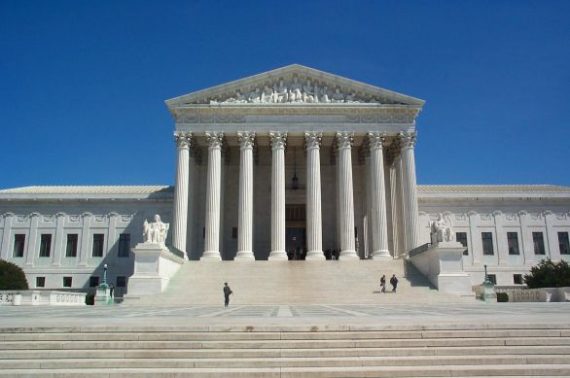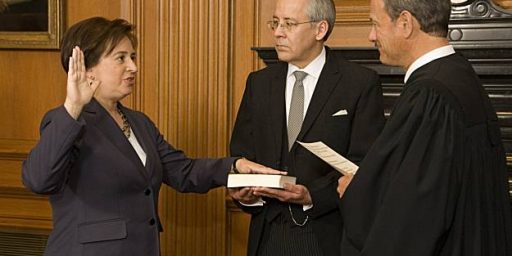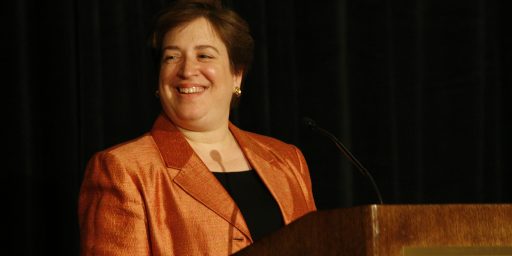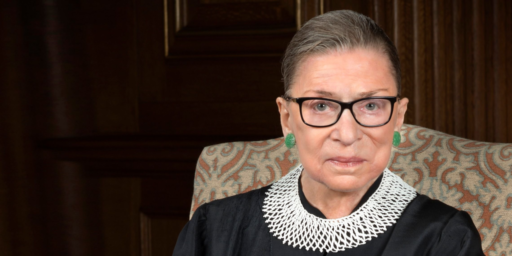Supreme Court Confirmation Crisis?
Are we nearing the point where presidents won't be able to fill Supreme Court vacancies?
Jonathan Chait notes that the 63-37 margin by which Elena Kagan was confirmed is “five fewer than Sonia Sotomayor last year, 15 fewer than John Roberts got in 2005 and pales in comparison to the 96-3 coronation of Ruth Bader Ginsburg in 1993.” He wonders, “Is Kagan Obama’s Last Justice?”
Bear in mind that, before Obama picked her, Kagan was touted as the consensus pick most likely to gain Republican support. (Ginsburg had been head of the ACLU’s Women’s Rights Project — imagine a nominee like that getting through the Senate today, let alone with 96 votes!)
The Republican pretense that judicial nominees, and judicial nominees alone, should be entitled to a majority vote is a hangover from a tactical position the party took during the Bush era. Republicans “didn’t filibuster” Kagan because they didn’t have 40 votes to stop her. After the 2010 elections, their numbers will almost certainly increase to the point where even a moderate like Kagan stands little chance of clearing the 60 vote threshold.
And this has all taken place in a landscape where Obama has merely been replacing liberal justices with other, possibly less liberal, justices. Can you imagine what will happen if one of the five conservatives retires on Obama’s watch? It’s entirely possible that Senate Republicans will simply refuse to confirm any more justices, period.
Jonathan Bernstein sees a “real train wreck, a total stalemate” ahead:
The obvious question is: what would have happened if there were only 52 or 53 Democrats in the Senate, or for that matter 48 or 49. Elena Kagan appears, by all accounts, to be a mainstream Democratic nominee; she certainly wasn’t on the short list of liberal advocates, although she was broadly acceptable to most of them. Can any Obama nominee be confirmed to the Supreme Court next year? The problem here is that compromise is almost impossible to imagine over the Court. Does anyone believe that Thune, DeMint, and the other Senators who may be running for president next year could accept any nominee from Barack Obama? And, after Bob Bennett and the rest of the primaries this year, does anyone believe that more than a handful of Republicans will stand up to the threat of a primary?
Matt Yglesias goes a step further:
The question is sharpened further when we consider that Kagan was appointed to replace probably the most left-wing justice on the court. By most accounts, her ascension will shift the court slightly to the right. Antonin Scalia is 74 years old. Obviously, he’ll try to hold on to his seat until there’s another Republican in the White House but he may not make it. Is there any replacement a Democrat could make for him that would garner bipartisan support? I have a hard time seeing it.
Kevin Drum takes this to its logical conclusion:
So what happens if this becomes institutionalized? It means that no president with a Senate controlled by the opposite party will ever be able to place someone on the Supreme Court. So then what? Perhaps the new norm will become automatic recess appointments without even the pretense of a Senate hearing. And since recess appointments only last through the end of a president’s term (assuming he continually reappoints his candidates at the beginning of each new Congress), this would place a premium on justices resigning only when a congenial president is in office (already a well accepted norm) and doing it early in his first term in order to give the new folks at least seven or eight years on the bench. Keep this up for a couple of decades, and you’d essentially end up with a system in which incoming presidents replaced virtually the entire court during their first year.
Despite the fact that I agree that:
- Presidents are entitled to considerable deference in getting nominees confirmed
- Kagan should have been a slam dunk confirmation
- The process is getting increasingly frustrating
this all strikes me as overwrought. This is a nominee that got five Republican votes and had one Democrat vote against her. And now she gets a lifetime appointment to a body that has become essentially a sitting Constitutional Convention. With precisely the same voting power as Ginsburg or Scalia or any of the judges who got confirmed by a larger margin.
This falls somewhat short of a crisis.
But let’s say that the next Congress has 49 Senators caucusing as Republicans and 51 as Democrats. And let’s say that the current level of polarized tension remains. Both are distinct possibilities.
And let’s say that Antonin Scalia’s seat is vacated. It’s unlikely that he’d retire during Obama’s tenure and one hopes his health holds up but it’s not an absurd notion. What then?
Given a precarious position in the Senate and a vacancy with the potential to radically shift the direction of the Supreme Court, Obama couldn’t nominate an Elena Kagan or Ruth Bader Ginsburg and expect to see her confirmed.
Arguably, that’s not such a bad thing. The 2008 election was neither a rejection of Republican judicial philosophy nor a mandate for Democratic jurisprudence but rather a rejection of the excesses of the Bush years and an embrace of a fresh new face. And a major Republican bounce in the midterms would hardly be a call for more liberal judges.
Ah, but the mean old Republicans would just never allow any Democrat at all to replace Scalia! They’d have a two-year filibuster!
Nonsense. Obama would just have to get creative.
Yes, the atmosphere has gotten testier. But there’s also been a vicious cycle wherein the Senate comes down hard on very controversial nominees and presidents counter by nominating people who are ciphers. This, in turn, leads to digging up every bit of information that can be gleaned and then trying to come up with an Aha! movement out of the one of two interesting things the person has managed not to conceal.
Instead, maybe presidents should go back to the older tradition of nominating people that Senators know and like?
Rather than a liberal academic or appellate court judge, maybe Obama would instead pick a Democratic Senator. Yes, there’s less comity across the aisle than there was in the days of Sam Rayburn. But there are still a handful of Senators and Representatives and cabinet members and the like who command tremendous respect on both sides of the aisle. The kind of folks whose names always come up for the blue ribbon committees or the “bipartisan” cabinet appointments.
The Judiciary Committee would be an obvious place to start. Pat Leahy, the chairman, is a mite long in the tooth. But how about Russ Feingold (Rhodes Scholar, Harvard Law)? Or Chuck Schumer (Harvard Law)? Or Sheldon Whitehouse (UVA law, former US Attorney)? They’re all qualified for the Court and, so far as I know, well regarded by their fellow Senators. Surely, one of them could survive a filibuster from their colleagues? There are other Senators and Congressmen who are qualified and confirmable, too. My guess is that there are a hundred Democrats who could sail through without much of a problem. Or, hell, throw them a curve and pick a moderate Republican who’s friendly to the Democrats on social issues.







1. Drum’s thinly-disguised advocacy of “automatic recess appointments without even the pretense of a Senate hearing” illustrates the practical importance of the courts enforcing <a href=”http://stubbornfacts.us/law/limits_recess_appointment_power”>the original meaning of the recess appointments clause</a>.
2. I’m not as convinced as others that Presidents are entitled to considerable deference in getting article III nominees confirmed. Executive branch nominees, certainly, because they are the “hands of the President” in carrying out his duties, see United States v. Cox, 342 F.2d 167, 171 (5th Cir. 1965) (en banc). But there is little normative case for deference to a President’s appointments to lifetime judicial posts, the constitutional case rests mainly on a fairly weak structural inference (the President initiates a process grounded in Article II, which certainly implies that the President takes the lead, but need not imply Senate deference), and the historical case rests on premises that have largely been falsified.
Nor is it clear to me why “Kagan should have been a slam dunk confirmation.” We now recognize that it is not simply a matter of qualifications and credentials—that judicial philosophy matters. That genie is out of the lamp. Every nominee will be evaluated, either formally or otherwise, for signs of their understanding of what courts are supposed to do and how they should do it. The death of any pretense that qualifications and resume alone are sufficient is a happy development, and it was perfectly reasonable that people would want to know more about how Kagan sees the legal process than about her resume.
3. The notion of appointing any legislator to the court in this era is unpleasant enough, James, but <i>Schumer</i>? <i>Feingold</i>? A bath of slime.
Alito was only confirmed by a vote of 58 to 42. Seems like things are improving.
Senate comity notwithstanding, there’s no way Russ Feingold or Chuck Schumer would ever be confirmed as an Associate Justice as long as the Republicans can filibuster the nomination.
In my humble but outspoken opinion, of course.
“Alito was only confirmed by a vote of 58 to 42. Seems like things are improving.”
You think the Republicans would not have filibustered if they had 42 votes?
Steve
Kagen should be slam dunk ?
no experience as a lawyer
no experience as a judge
did I miss something ?
smart … yes … so is my dentist …
a woman … yes … so is my sister …
refused to follow the law at Harvard … yes … alot of people don’t follow the law …
sued to to allow her to continue to not follow the law … got beat 9-0 by the Supreme court … 9-0 … again 9-0 not 5-4 … there is wrong and then there is 9-0 …
Yes, she really should be a slam dunk … she’s so qualified …
But that’s definitionally true. The Republicans would have had 42 votes but 5 of their members along with one Democrat thought Kagan should be confirmed. And among the defectors were Republicans up for re-election in November.
steve, no I don’t think they would have filibustered with 42 votes. Minority party votes are just messages. Here, I guess the message is that Kagan is unqualified and too liberal. Chait and company seem to have internalized this message as having some consistency over time.
But the message when Ginsberg was confirmed was different: The Republicans said she was too liberal, but as a Court of Appeals Justice she was qualified, regardless of ideology. Why would that be their message? Hint: (Scalia, Kennedy, Thomas, Roberts, and Alito)
If the Republican message becomes ideological purity is grounds for filibuster, any realistic aspiration to overturn Roe v. Wade is over.
Given that the case is now almost four decades old and we’ve now had two consecutive young Democratic appointees, I think that’s already the case.
“Here, I guess the message is that Kagan is unqualified and too liberal.”
Perhaps you are correct. However, is there really any candidate a Democratic president could nominate who would not be considered too liberal? I think James tries to make the case, but I think Boyd nails it.
Steve
I think the current Republicans do not recognize the legitimacy of any control but thier own regardless of consequence to the nation (not so regardless to consequence to their own political careers), so I think Boyd has it nailed. Their is no candidate that they would find acceptable with a D after their name to replace one of the conservative justices.
That being said, I don’t think it would come down to a recess appointment either, because there is just too much political theater in sending candidate after candidate to the Senate and having them get shot down on trivial grounds. The third or fourth candidate would be confirmed just to appease the camera’s.
If such an extreme scenario presented itself in the future, could not the filibuster itself be modified or even done away with…
Is Samuel Alito Republican’s Last Justice?
Alito’s meager tally (58-42) is twenty fewer than John Roberts, Jr. only two months before, 29 fewer than Breyer got in 1994, and pales in comparison to the 90-9 coronation of David Souter in 1990.
[Phrasing and logic copied from Jonathan Chait] If you ignore major data points, you can come to whatever conclusions you like.
Senate confirmation votes for Supreme Court Nominations, 1960-present
Republican administration, Republican Senate majority
Samuel Alito, Jr. 58-42
Harriet Miers [withdrawn]
John Roberts, Jr. 78-22
John Roberts, Jr. [withdrawn]
Antonin Scalia 98-0
William Rehnquist (elevation) 65-33
Sandra Day O’Connor 99-0
Republican administration, Democratic Senate majority
Clarence Thomas 52-48
David Souter 90-9
Anthony Kennedy 97-0
Robert Bork 42-58
John Paul Stevens 98-0
William Rehnquist 68-26
Lewis Powell, Jr. 89-1
Harry Blackmun 94-0
G. Harrold Carswell 45-51
Clement Haynsworth, Jr. 45-55
Warren Berger 74-3
Democratic Administration, Democratic Senate control
Elena Kagan 63-37
Sonia Sotomayor 68-31
Stephen Breyer 87-9
Ruth Bader Ginsburg 96-3
Homer Thornberry [no vote]
Abe Fortas [filibustered and withdrawn]
Thurgood Marshall 69-11
Abe Fortas voice vote, confirmed
Arthur Goldberg voice vote, confirmed
Byron White voice vote, confirmed